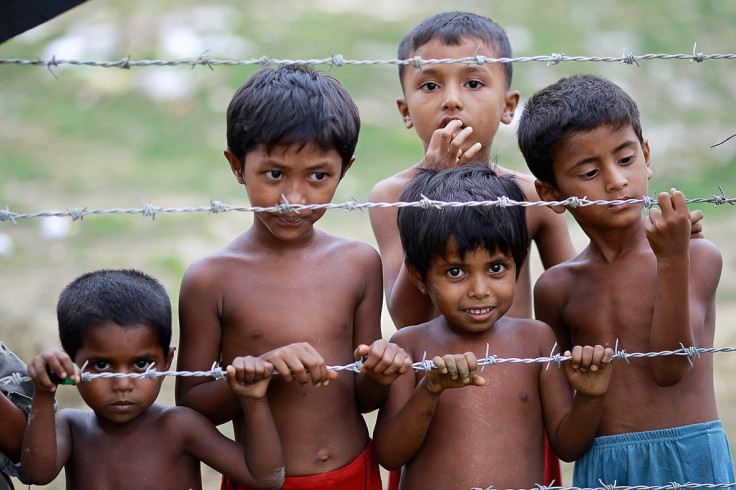Donald Trump's election will only embolden Myanmar in its genocide against the Rohingya
Only international condemnation has prevented all out war against the Muslim minority.
Often described as "the most oppressed people in the world", the Rohingya Muslim minority of Myanmar may well be on their way to being the victims of a genocide. Already as many as half of them have been displaced from Myanmar, the country of their birth, and many of the rest are now in internally displaced people's camps inside the country in appalling conditions.
Yet for all the decades of oppression they have endured, especially in the last few years, things may well be about to suddenly get a lot worse.
This calamity does not have very much to do with the United States or its historic foreign policy. The crisis facing the Rohingya has been mostly driven by the internal politics of the long-secluded country. Decades of propaganda by the succession of military juntas that have governed the country since 1962 have been absorbed into the political culture to the point that hostility towards this minority is now democratic consensus – even as the country has now started gaining democratic freedoms.
A series of very serious outbursts of communal violence in 2012 and 2013 caused the largest amount of damage to Rohingya communities and culminated in the regional South East Asian Migration Crisis last year. And ever since, ultra-nationalists and Buddhist extremists are fanning the fires of that hostility into open violence at any given opportunity.
The most recent violence came after nine police officers were killed and several others injured in attacks on border guard posts near the border with Bangladesh on Sunday, 9 October. The Rohingya were collectively declared guilty of the attacks, despite there being no evidence that the attackers were, in fact, Rohingya. Never mind which individuals, Rohingya or otherwise, might have been the actual perpetrators.
The collective punishment heaped on the Rohingya by state institutions such as the police and army was swift. Dozens of innocent Rohingya were killed within a day and aggression of all kinds by local state organs against the minority are still ongoing even as we speak.
China does not care about the fate of the Rohingya, Russia does not either, and now neither does the new administration in the United States.
What is worse is that while these extra-judicial killings have been carried out by local state agencies, the federal forces of the government of Aung San Suu Kyi have not intervened to stop them. And if the Rohingya finally give up hope that anyone else might stand up to defend them, they may well end up taking their defence into their own hands. This will feed into the military's narrative that the Rohingya are a threat to the state, and fighting will break out in full force. Not that the Rohingya have the resources to fight such a fight – such a fight can only have one result: outright genocide.
This is just the internal dynamic of the crisis. But here is where the results of the US election become salient. While Aung San Suu Kyi has been the most reticent of human rights promoters when it came to the Rohingya, she had started to respond to international pressure to do more about their plight. Just this summer her government was persuaded by the international community to establish a commission on the situation of the Rohingya headed by former UN Secretary General Kofi Annan.

Most of that international pressure came from President Barack Obama, who has even visited the country twice during his presidency and was more outspoken about the fate of the Rohingya than any other head of state in the world. And as far as I can ascertain, that pressure has been the only thing that has driven Suu Kyi to even engage with the issue, inadequate as that engagement has been to date.
But now there is a new president in the White House. Dr Aye Maung, leader of the Arakan National Party, and one of the foremost ultra-nationalist promoters of violence against the Rohingya since even before 2012, was one of the first to congratulate Trump on his election to the White House. He was also keen to draw parallels between Trump's rhetoric about immigration and Muslims and his own campaign to cleanse the Rohingya from Myanmar. But the parallels will not be lost on anyone else either – certainly not on Aung San Suu Kyi and her colleagues in the federal government.
For the past few years I have argued that the only check on Buddhist nationalist aggression against the Rohingya has been international opinion. The international community, though maddeningly shy in its entreaties, has nevertheless been consistently a factor to which Burmese leaders had to be sensitive to, whenever tensions between the Rohingya and their neighbours, or various organs of the state, escalated.
Now that constraint has been largely removed. China does not care about the fate of the Rohingya, Russia does not either, and now neither does the new administration on the United States. The chances that Europe's leaders would be willing and able to step in and fulfil the role of moral conscience for Aung San Suu Kyi are also remote. And the Rohingya may start paying the price before Donald Trump is even sworn in.
Dr Azeem Ibrahim is a Senior Fellow at the Center for Global Policy and author of "The Rohingyas: Inside Myanmar's Hidden Genocide" (Hurst Publishers & Oxford University Press).
© Copyright IBTimes 2025. All rights reserved.






















